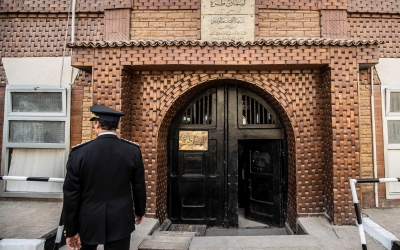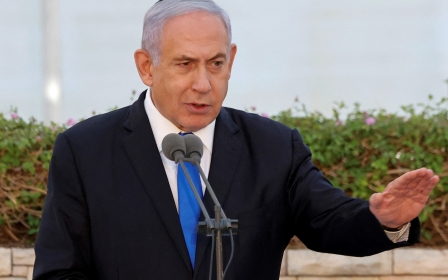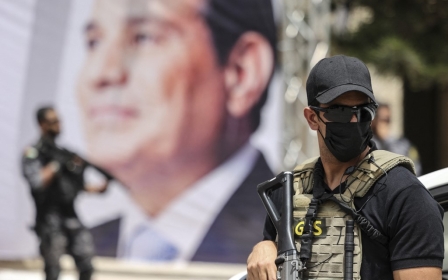How Israel's latest offensive on Gaza shifted Biden's tone on Egypt

The US administration has been patting itself on the back for what it calls "quiet" and "relentless" diplomacy that it credits for securing a ceasefire in Gaza last month.
According to official readouts and public statements, these behind-the-scenes efforts heavily involved Egypt - a government led by a leader whom US President Joe Biden described not long ago as Donald Trump's "favourite dictator".
After US Secretary of State Antony Blinken met with Abdel Fattah el-Sisi in Cairo last week, the State Department released a statement heaping praise on the Egyptian president.
"The Secretary conveyed President Biden's appreciation to President Sisi for Egypt's critical mediation efforts in support of a ceasefire between Israel and Hamas and other groups in Gaza and for Egypt's help in evacuating American citizens to safety," State Department spokesperson Ned Price said.
"The Secretary affirmed the strong strategic partnership between the United States and Egypt, and President Biden's commitment to this relationship."
With the US unwilling to communicate directly with Hamas, which is designated as a terrorist group by Washington, it relied on Arab countries, including Egypt, to convey messages to Palestinian parties in Gaza - even though Cairo had blacklisted Hamas as well.
Raed Jarrar, advocacy director at Democracy for the Arab World Now (DAWN), said Sisi should not be absolved of his human rights abuses for acting as a messenger between the US administration and Palestinian factions.
He added that the approach underscored the administration's flawed policies on both Egypt and Israel-Palestine.
"President Sisi is not a hero. He is not a peacemaker. The right way to describe him is that he is a dictator who led a bloody coup where crimes against humanity were committed against his own people," Jarrar told MEE.
Continuing aid
Advocates say they fear that Washington's long-standing geopolitical interest in maintaining good ties with Cairo - as demonstrated in the recent Gaza crisis - may dull the push to demand more accountability for human rights abuses from Cairo.
The White House budget proposal to Congress for next year seeks the usual $1.3bn in annual military aid to Egypt without reductions or conditions.
Last year, Biden had rebuked the Egyptian government for arresting and threatening the families of Egyptian-American activists.
"Arresting, torturing, and exiling activists like Sarah Hegazy and Mohamed Soltan or threatening their families is unacceptable. No more blank checks for Trump's 'favorite dictator'," then-candidate Biden wrote on Twitter in July 2020.
As president, Biden has pledged to pursue a human rights-centred foreign policy.
"It's hard to reconcile how you can have human rights be at the centre of the relationship when you're at the same time asking for more than $1bn in military aid, and you don't want human rights conditions placed on it," said Seth Binder, advocacy officer for the Project on Middle East Democracy (Pomed).
Activists have been calling on Biden to use the assistance as leverage to push Sisi's government to end its human rights abuses.
With Egypt cementing its role as an immediate mediator between Israelis and Palestinians, the prospect of restricting or conditioning aid to Egypt is diminishing. After all, Washington's assistance to Cairo, which started after the Egyptian government normalised relations with Israel, is linked more to geopolitics than human rights.
"Building and enhancing lasting security partnerships, such as those with Israel, Egypt, and Jordan, is critical to promoting regional stability, collectively deterring aggression, and reducing threats to US and partner interests in the region," a section on military aid to the Middle East in the White House budget proposal reads.
When Biden himself spoke to Sisi last month, human rights issues were an afterthought as demonstrated by a passing line in a statement released by the White house.
"President Biden thanked Egypt for its successful diplomacy and coordination with the United States to end the recent hostilities in Israel and Gaza and ensure violence does not reoccur," the statement said.
"The two leaders consulted on the urgent need to deliver humanitarian assistance to those in need in Gaza and to support rebuilding efforts in a manner that benefits the people there and not Hamas."
They also addressed the Ethiopian Renaissance Dam, the crisis in Libya, and support for Iraq, according to the White House.
The second-to-last sentence in the statement reads: "President Biden underscored the importance of a constructive dialogue on human rights in Egypt."
Shifting tone
After Blinken met Sisi days later, human rights were not mentioned until the very last sentence in the State Department readout: "The Secretary stressed the importance of human rights, and the two leaders agreed to engage in a constructive dialogue."
For contrast, when Blinken spoke to his Egyptian counterpart, Sameh Shoukry, in February, the State Department's readout said: "The Secretary raised concerns over human rights, which he emphasized would be central to the US-Egypt bilateral relationship."
Binder said the Biden administration has shifted its tone towards Egypt since the Gaza crisis.
"There has been a demonstrated change in the rhetoric... It does seem to send a clear signal that these other issues are taking precedent, and human rights aren't quite as central as human rights advocates would like," Binder told MEE.
Since rising to power in a 2013 coup that toppled democratically elected President Mohamed Morsi, Sisi has ruled Egypt with an iron fist, jailing tens of thousands of dissidents and outlawing virtually all forms of political opposition.
During his tenure, Trump regularly lauded Sisi, drawing outrage from Democrats, who accused him at the time of compromising American values.
But Washington's cosy ties with autocrats in Cairo predate Trump's presidency and appear to have outlived it.
Binder said there is genuine concern for human rights in Egypt amongst Democratic lawmakers, saying that the push will continue during Biden's term. He highlighted the Egypt Human Rights Caucus in Congress, which was formed days after Biden took office earlier this year.
"It wasn't something that was a political response to the Trump administration," he said of Democrats' advocacy for human rights in Egypt.
Middle East Eye propose une couverture et une analyse indépendantes et incomparables du Moyen-Orient, de l’Afrique du Nord et d’autres régions du monde. Pour en savoir plus sur la reprise de ce contenu et les frais qui s’appliquent, veuillez remplir ce formulaire [en anglais]. Pour en savoir plus sur MEE, cliquez ici [en anglais].






